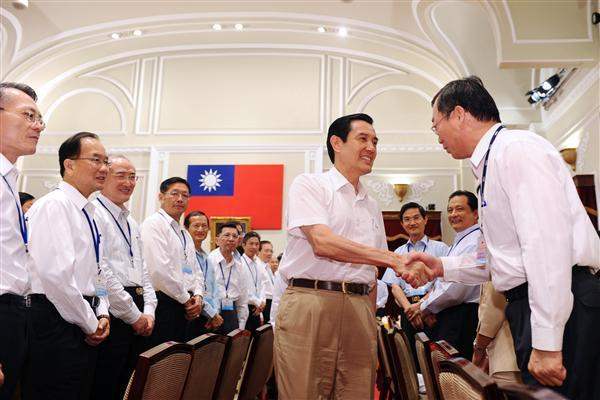News & activities
 News releases
News releases
President Ma Ying-jeou on the evening of August 15 held a dinner for ROC diplomats who have returned to Taiwan to take part in a conference for diplomats stationed overseas. The president cautioned the diplomats about getting complacent in their work just because the ROC has instituted the policy of viable diplomacy and stopped engaging in contentious struggle with mainland China. President Ma encouraged each of the diplomats to continue to spare no effort in their work, so that the ROC can make a greater contribution to the world community.
The president noted that this conference had not been held for 15 years, and explained that the main reason for summoning the diplomats to the conference this year was to help them better understand recent developments at home. He also called on them to make use of their time back here to meet with individuals from various walks of life and get a feel for the differences between Taiwan now and in the past.
The president stated that many changes have been instituted in diplomatic policies over the past three years. He noted that on August 4, 2008 he visited the Ministry of Foreign Affairs and introduced the concept of viable diplomacy. Over the past three years, the government has gradually realized the objectives it had targeted, and has seen substantive benefits result from the achievement of greater peace and prosperity on both sides of the Taiwan Strait. These benefits, the president stated, include the consolidation of diplomatic alliances, the restoration of trust at the highest levels with countries that do not maintain diplomatic ties with us, stronger liaison with important regional organizations, and the adoption by international organizations of a number of resolutions friendly to us. These are unprecedented achievements, he said.
President Ma emphasized that Taiwan's economy must be further liberalized and internationalized, but until all the necessary domestic preparations have been completed, however, it will not be easy to participate in regional economic cooperation. The diplomatic corps is on the front line in pushing this agenda, he said, but acknowledged that their efforts are impeded when polices have yet to be fully implemented here. Consequently, the government will make every effort to restructure the domestic economy and adjust industrial policies so that the diplomatic corps can pursue greater business opportunities for Taiwan in the international community.
The president pointed out that the ROC's Minister of Health is now able to take part in the World Health Assembly in his capacity as a cabinet minister. In addition, the nation has also become a party to the Agreement on Government Procurement. These are just a couple of the substantive diplomatic successes we have achieved over the past few years, he said. The president particularly noted that the public can directly benefit from the convenience afforded by 117 jurisdictions throughout the world providing ROC nationals with visa-free courtesies or landing visas. He added that many businessmen and citizens who frequently travel overseas have expressed their deepest appreciation to the ROC's diplomatic corps for the efforts they have made to provide Taiwan's citizenry with greater convenience.
The president noted that diplomatic work has always been a tough job. However, we cannot become complacent now that we have seen improvements in cross-strait relations. In fact, there is room for much more work to be carried out regardless of the state of bilateral or multilateral relations. President Ma reiterated that the ROC wants to be a peacemaker, a provider of humanitarian aid, a promoter of cultural ties, a creator of new technologies and business opportunities, and a standard-bearer of Chinese culture in the international community. These ideas are embodied in Article 141 of the ROC Constitution, he said, noting that the basic national policy stated in the Constitution defines the ROC's diplomatic objectives. President Ma also said that we seek to assist others and this is the reason that others are willing to provide help to us. These efforts constitute an important process in building Taiwan's soft power, he said, pointing out that visa-free courtesies did not simply dropp in our lap. Rather, the granting of such courtesies constitutes recognition by the international community of the quality of our people and praise for Taiwan.
President Ma stated that we have a long road ahead of us and that the diplomatic corps must continue to play the five aforementioned roles. We cannot rest on our laurels simply because of the success of viable diplomacy or the end of contentious struggle with mainland China, the president said, commenting that the ROC must be able to make even greater contributions to the world community.
The diplomatic corps attending the evening's conference and dinner was led by Minister of Foreign Affairs Timothy Chin-tien Yang (楊進添) to the Presidential Office. Also attending the event was National Security Council Secretary-General Hu Wei-jen (胡為真) and Presidential Deputy Secretary-General Kao Lang (高朗).



